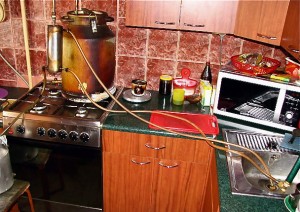
Drinking homemade alcohol is very commonplace in Latvia, and sometimes the consequences are deadly. Photo used courtesy of the Liepāja Police Department.
RIGA — The Riga municipal government is considering tightening restrictions on homemade alcohol production, but it’s likely to do little to stop curb the widespread practice that has caused scores of deaths over the past few years.
The Riga City Council on Tuesday morning discussed ban the issuance of permits for homemade alcohol production to people living in apartment buildings, citing ventilation and odor problems. The change would be part of a planned overhaul of the permit-issuing process in an effort to get a better control over moonshine makers.
Producing alcohol for sale without a permit can bring up to five years of jail time and 18,000 lats (€25,400) in fines.
However, the changes will not ban the the practice outright, as anyone can continue making homemade alcohol, or kandža in Latvian, for personal use which makes enforcement of the ban difficult. The World Health Organization estimates the Baltic states along with other Eastern European countries have the highest unrecorded alcohol intake worldwide, and domestic statistics show that alcohol intake has doubled since the country regained its independence in 1991.
Also the country’s tough economic situation has likely increased homemade users, as the lower cost makes this tradition that lasted even through the Soviet era more appealing. The government estimates as much 20 percent of alcohol consumed in Latvia is homemade.
“The rapid excise tax and VAT rate increases … does not mean that people will reduce their consumption of alcoholic drinks. This situation will favor the production of illegal alcohol,” Kārlis Andersons, chairman of Latvijas Balzams said in an interview last year.
This article is free to view. To read Baltic Reports’ subscription-only articles, click here.












